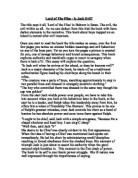Jack is also presented as an evil, violent character. He verbally bullies Piggy, calling him “Fatty” and telling him to “Shut up” because he wants the other boys to laugh, which give him a sense of control over them. His vicious words indicate his behaviour later in the novel. As the story progresses, Jack becomes more openly evil. He smacks Piggy in the head when he is scolded for his mistake of not keeping the fire going. This shows the complete abdication of conscience, which also implies that civilisation, is starting to be rejected. The breaking of the glasses is significant as it symbolises the breaking of the link to civilisation. It’s almost as if Jack is trying to cast out civilisation from the island. He doesn’t see the point in building shelters and keeping the signal fire alight which shows he’s rejecting the possibility of a return to civilisation. He also tries to bend the rules by saying that the conch “doesn’t count” on the mountain and he completely refuses to abide by them, shouting “Bollocks to the rules!” In this way, Golding presents Jack as an adherent of the evil in every human where, no matter how you have been brought up, when you are placed in an environment with an absence of law and order, the evil becomes more prominent.
Golding uses Jack’s growing obsession with hunting as a clear indicator of his descent into savagery. Jack is not concerned about Ralph’s determination to build huts, which again shows he isn’t worried about the safety of the community. Instead, Jack prioritises hunting and claims: “We want meat”, even though the rest of his hunters have run off to swim. At the start, Jack finds it impossible to kill a pig because he’s unable to break through the moral grounds laid for him by society. However, he becomes more and more obsessed with hunting. For example, Jack cannot convey his “compulsion to track down and kill” and a ”madness” comes into his eyes when the thought of hunting pops into his head. This shows that Jack is becoming less civilised. When Jack camouflages his face, he sees himself as an “awesome stranger” who allows Jack not to take any responsibility for his actions and the mask marks the ending of civilisation, as the boys cannot go back to being civilised. The painting of his face symbolises the alienation from the community and the loss of identity as Jack has become a savage and is “liberated from shame and self-consciousness” which means he is unable to feel human emotion and thus isn’t human anymore. Golding describes this transformation by saying “his laughter became a bloodthirsty snarling”, making Jack sound more animalistic and feral. To confirm this, Jack gloats, “I cut the pig’s throat” which makes him sound violent. Jack’s uncontrollable desire to hunt shows how he has become more barbaric and shows how his choir have degenerated from an innocent, obedient choir into bloodthirsty hunters because of Jack’s influence.
Jack’s relationship with Ralph shows the constant battle between civilisation and savagery. At the start, there is a mutual feeling of respect between the two – after the argument over the huts; they smile at each with “shy liking”. This suggests that Jack respects a leader like Ralph and also suggests that they could work together instead of having two different mindsets. However, when Jack is enjoying the hunting too much to care about the signal fire, it is clear that they cannot be friends. Jack and the choir appear to be more savage, chanting: “Spill her blood”. The fact that Jack managed to break the twins away from their duties of tending the fire and sway them to his cause shows his controlling nature. Jack’s invite of fun (hunting) is clearly more appealing than having responsibilities (tending the fire), which shows us that the balance of power has shifted to Jack and thus making the boys less civilised. For example, when Jack apologises, a buzz of “admiration” is emanated from his hunters, which makes Jack look like the better leader than Ralph. The consuming of ‘Jack’s’ meat is important as Jack later says that Ralph cannot hunt so he has no right to tell people what to do. By succumbing to the meat provided by Jack, Ralph’s role has diminished and it is realised that Jack needs to lead. Jack is presented as a powerful, manipulative leader here as most of the boys, including the littluns, have started to follow him when at the start Ralph seemed like the best leader.









